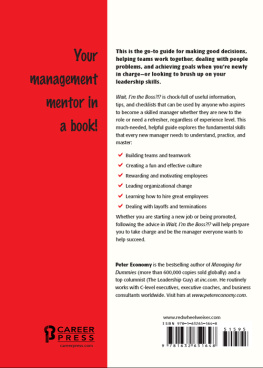Dorling Kindersley Limited
The Penguin Group
2 4 6 8 10 9 7 5 3 1
Published by the Dorling Kindersley Limited,
80 Strand, London WC2R 0RL
LONDON, NEW YORK,
MUNICH, MELBOURNE, DELHI
Dorling Kindersley Limited, Registered Offices: 80 Strand,
London WC2R 0RL, England
www.dk.com
First Published in paperback in 2002 by Dorling Kindersley Limited. ISBN: 9781405300278
Copyright 2003 Dorling Kindersley
Text copyright 2003 Christina Osborne
This Digital Edition published 2009. ISBN: 9781405352369
E-Pub version prepared by DK Digital Content Services, London and DK Digital Media, Delhi.
No part of this publication may be reproduced, stored in a retrieval system,
or transmitted in any form or by any means, electronic, mechanical, photocopying, recording, or otherwise, without the prior written permission of the copyright owner.
Introduction
Your relationship with your boss is one of the most important factors in achieving a successful career. Understanding how your boss thinks and works is the key to building a productive partnership. Managing Your Boss explains how you can get the best out of your boss, whether you are working under pressure or on routine tasks. It shows you how to assess the type of boss you have, suggests how to meet the challenges of working with a difficult boss, and teaches you how to play to your bosss strengths and weaknesses. Practical advice is given to help you define your goals and pursue self-development. A self-assessment questionnaire evaluates how well you manage your boss. Packed with 101 tips, the content will help you turn your boss into your greatest advocate.
Assessing your Situation
You can only be effective in your job if you learn to manage your boss. Assess what you want in your career and what you need from your boss so that you can work jointly to reach your goals.
Forming an Alliance
You and your boss need each other to succeed, and your relationship is of vital importance. Learn from, and manage this useful ally, so that you can work together effectively as a team, gain job satisfaction, and achieve your career aims.

Think of your boss as a key customer and your best advocate.

Assess what you and your boss need to work on to be a team that achieves results.
Managing your future
You are responsible for your career development and for being effective in your current job. Your boss and others can help you, but ultimately you manage your own future. Learn to manage your relationship with your boss and remember that she is only human and may need some help. Assess your own and your bosss strengths and weaknesses and note down areas that need development. Although your boss may not be ideal, make the best of what is likely to be a transitional situation. If you have a good boss, take full advantage of the period during which you are working together.

Aspiring for the topIn a flat organizational hierarchy, which has few management layers, you need to stand out as exceptionally competent to gain promotion. In an organization with just three hierarchical layers, there will be intense competition among peers in the lower layers.
Learning from your boss
If you succeed, your boss has a greater chance of success. If your boss is successful, you will be seen as part of a winning team. Bosses like to be known for producing winners. An experienced boss can teach you good judgment in different situations. The contacts that your boss has made can be very useful to you in your career. Be clear to your boss about what help you need to excel at your job, and do not be too proud to take it.
Points to remember
- Awareness of your own abilities and goals helps you manage your relationship with your boss.
- Although your boss can help you to succeed, you are ultimately responsible for your own future.
- You should learn as much as you can from an efficient boss.

Acquire your bosss skills by observation.
Assessing yourself
When you and your boss share important values and goals, you are more likely to succeed in your job. Understand yourself and what you want out of life and your career, and then ask your boss for help in working towards those goals.

Match your goals professional and personal to your values.

Write down your aspirations in order of their importance to you.
Determining values
Be clear about the values that are important to you and decide which career or organization will be compatible with them. Your boss can understand your motivation only if you know what your priorities are. Think about what is important to you and listen to your feelings. Talk to family and friends about what you would like to achieve and where your uncertainties lie. As you explain, listen carefully to your own choice of words. They can reveal what you really feel about your stated aims.
Determining your values and goals| Values | Goals |
| Building Wealth | Accumulate assets of 500,000 within 10 years. |
| Career Advancement | Gain recognition as an expert in my field within five years. |
| Healthy Lifestyle | Have a balanced diet and exercise regularly. |
| Security | Pay off all my debts within two years. |
| Quality Time with Family | Ensure all weekends off and five weeks holiday per year. |
| Spiritual Renewal | Set aside 15 minutes daily to meditate. |
Setting your goals
Being sure about your goals will help you to discuss with your boss, when the time comes, what you want from your career and how he can help you to achieve your aims. Make a comprehensive list of goals in all the areas of your life for example, in work, learning, or relationships because each one affects your personal work-life balance and the extent to which you can expect your bosss help.

Think of goals associated with your mind, body, heart, and spirit.

Visualizing goalsClose your eyes and think of your goals a prestigious job, wealth, family. Imagine you have achieved them. Are you happy and are these the right goals? Note what you have learned by looking at your future.










 Think of your boss as a key customer and your best advocate.
Think of your boss as a key customer and your best advocate.
